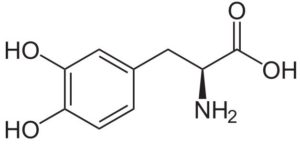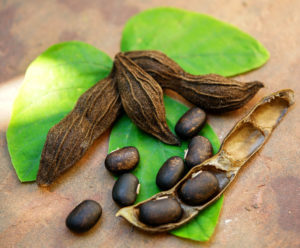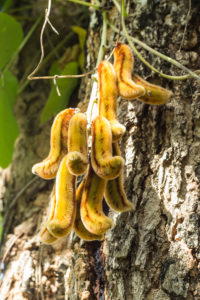Table of Contents
Key Takeaways
- L-DOPA is a vital amino acid precursor of neurotransmitters dopamine, epinephrine, and norepinephrine synthesized in the brain from l-tyrosine.
- Mucuna Pruriens is a natural source of L-DOPA, used as a nootropic to enhance brain function by increasing dopamine levels.
- L-DOPA from Mucuna Pruriens can improve memory, cognition, mood, and overall brain health while reducing stress and acting as an antidepressant.
- Opt for organic Mucuna Pruriens extract with higher L-DOPA concentrations (15% – 30%) to ensure better tolerance and efficacy, avoiding synthetic versions used for Parkinson’s treatment.
- Nootropic use of L-DOPA is generally safe and well-tolerated, but caution is necessary to avoid tolerance and dependence issues.
See my article on all of the supplements that have been shown to help with Parkinson’s here: Best Supplements for Parkinson’s Disease
L-DOPA (levodopa, L-3,4-dihydroxyphenylalanine) is an amino acid synthesized in your brain by the amino acid l-tyrosine. L-DOPA is a precursor of several neurotransmitters including dopamine, epinephrine, and norepinephrine.
Mucuna Pruriens contains naturally occurring L-DOPA in high concentrations. And is used as a nootropic because dopamine itself cannot cross the blood-brain barrier.
Dopamine and norepinephrine are essential for memory, cognition, and a positive mood. A lack of either of these neurotransmitters can lead to a lower mood state, loss of memory, brain fog, poor energy, and more. And if left unchecked will eventually result in neurodegenerative diseases like Parkinson’s.
L-DOPA helps:
- Brain Health. L-DOPA helps to increase growth hormone levels in the brain. Boosting the production of neurons and glia cells affecting the formation of memories, and overall brain health.
- Neurotransmitters. L-DOPA is a necessary precursor for your brain to make dopamine. And dopamine is then synthesized into the neurotransmitters epinephrine, and norepinephrine. Affecting cognition, learning, memory, movement, motivation and pleasure.
- Neuroprotection. L-DOPA produces neuromelanin which is similar to the melanin pigment in your skin. In your brain they absorb toxic quinones, and chelate heavy metals like mercury and lead.
Overview
L-DOPA (levodopa, L-3,4-dihydroxyphenylalanine) is an amino acid that’s naturally synthesized in your brain by the amino acid l-tyrosine.

L-DOPA is a necessary precursor to the synthesis of the neurotransmitter dopamine. Called a catecholamine, dopamine is then synthesized into the other catecholamines epinephrine (adrenaline) and norepinephrine (noradrenaline).
Unlike Dopamine, L-DOPA can cross the blood-brain barrier. This is why we supplement with L-DOPA rather than dopamine.

And for a dopamine boost, neurohackers use Mucuna Pruriens, which contains high levels of L-DOPA.[i] This legume, native to the tropical regions of India, Africa and the West Indies, and also known as velvet bean, has been used in Ayurveda medicine since 1500 B.C.
The ancients used Mucuna Pruriens to treat things like snakebite, intestinal problems, sexual issues, and a melancholy mood.
Raising levels of the neurotransmitter dopamine in your brain helps regulate mood and cognition.[ii]
Mucuna Pruriens vs. L-DOPA: What’s the Difference?
Mucuna Pruriens is an extract of the velvet bean plant that grows 3 – 18 meters in height. L-DOPA (levodopa) is usually synthetic and made in the lab.
The natural version of L-DOPA from Mucuna Pruriens is generally well-tolerated by most people. And the compounds in the plant are bio-identical to those chemicals naturally made in your body. Not so with synthetic L-DOPA.
Synthetic L-DOPA is metabolized into dopamine in your body by an enzyme called aromatic L-amino acid decarboxylase (AADC). And the majority of synthetic L-DOPA will be converted peripherally (not in the central nervous system and brain). This can cause problems.
So when used therapeutically, as in treating Parkinson’s Disease, L-DOPA is administered in combination with an inhibitor of peripheral AADC. Drugs like carbidopa (or other AADC inhibitors) ensure most of the L-DOPA is preserved for conversion to dopamine in the brain. And not the rest of your body.
This is critical for nootropic users to keep in mind. Chronic, or prolonged use of synthetic L-DOPA can lead to things like dyskinesia. This is a movement disorder where neurological discoordination results in uncontrollable, involuntary movements.[iii]
I am not telling you this to dissuade you from using L-DOPA. Stick with an extract of Mucuna Pruriens and you should be fine.
How does L-DOPA Work in the Brain?
L-DOPA boosts brain health and function in several ways. But two in particular stand out.
- L-DOPA improves memory. It’s metabolized into dopamine in your body by an enzyme called aromatic L-amino acid decarboxylase (AADC). This increases dopamine levels in your brain.
Researchers at the University of Münster in Germany conducted a study with 40 healthy people. In this randomized double-blind study, they gave one group 100 mg of levodopa daily for 5 days. The other group took a placebo.
90 minutes later on each day, subjects were given a memory test based on vocabulary. The study found that levodopa significantly enhanced the speed, overall success, and long-term retention of novel words.[iv]
- L-DOPA promotes brain health. Research suggests Mucuna Pruriens protects your brain by regulating cognitive and neural functions. And even encouraging neural activity.
Researchers in India showed that Mucuna Pruriens is a potent antioxidant. They performed assays to evaluate the enzymatic and nonenzymatic antioxidants in extracts. They found high levels of flavonoids, alkaloids, tannic acids, gallic acids, quercetin equivalents, and sitosterol equivalents.[v]
All of these compounds scavenge for free radical in your brain. Free radicals are formed during normal brain activity, like the synthesis of ATP that is produced in your mitochondria.
Your brain is equipped to eliminate some of these free radicals on its own. But especially in today’s environment in which we live, your brain is overwhelmed. Free radicals cause inflammation which damages and can kill brain cells. Affecting memory, learning, recall, cognition and mood.
Mucuna Pruriens has been proven to be a very effective brain inflammation fighter. It even has the ability to chelate heavy metals like mercury and lead in brain cells. And it’s antibacterial.[vi]
Mucuna Pruriens helps your brain make naturally occurring neuronal pigments called neuromelanin’s. They’re similar to the melanin found in your skin. And they’re often found in regions of your brain where dopamine is active.
The synthesis of neuromelanin’s in the various regions of your brain is an important protective process. The melanic component is generated through the removal of reactive/toxic quinones that would otherwise cause neurotoxicity.
This melanic component promoted by Mucuna Pruriens is what chelates and accumulates toxic, heavy metals like mercury and lead.[vii] Preventing them from damaging brain cells.
How things go bad
As we get older, our brain chemistry and energy metabolism changes.
↓ Dopaminergic neurons are damaged or die
↓ Dopamine levels decline
↑ Stress levels increase
↓ Long-term memory and mood decline
All of these age-related changes are contributing factors to the neurodegenerative diseases of aging, including Parkinson’s Disease.
L-DOPA benefits for brain health
Mucuna Pruriens natural herbal supplement extract contains high levels of L-DOPA, the precursor to the crucial neurotransmitter dopamine. Dopamine is further synthesized into the neurotransmitters epinephrine (adrenaline) and norepinephrine (noradrenaline).
Dopamine plays a critical role in learning and absorbing new information. Increasing brain levels of dopamine helps regulate mood and boosts cognition.
Research also suggests that Mucuna Pruriens provides antioxidants that defend against oxidative damage caused by free radicals.[viii]
How does L-DOPA feel?
Neurohackers report that using Mucuna Pruriens helps in multi-tasking, improving motivation, more focus, less stress, and a sense of calm.
You could find your energy levels increase, less brain fog, and a boost in overall mood. A more positive outlook on life. And an increase in libido.
L-DOPA Clinical Research
Mucuna Pruriens (L-DOPA) as an
alternative for Parkinson’s Disease
Researchers at the Parkinson’s Institute located at the University of Milan in Italy recruited 18 patients with advanced Parkinson’s Disease. The patients were given either ground Mucuna Pruriens powder (standardized 5.7% L-DOPA) or prescription form of levodopa containing a dopa-decarboxylase inhibitor. And then measured motor improvements at 60 and 90 minutes after using the supplement or drug.
The researchers found Mucuna Pruriens standardized powder produced reduced Parkinson’s symptoms equivalent to the prescription version of levodopa. But with significantly fewer problems with dyskinesias. The team concluded the “Clinical effects of high-dose Mucuna Pruriens were similar to levodopa alone at the same dose, with a more favorable tolerability profile“.
Mucuna Pruriens reduces stress
A study was conducted to assess the role of Mucuna Pruriens in infertile men. It was done at King George’s Medical University in Lucknow, India. The study included 60 men who were undergoing infertility screening. And no surprise here; were found to be suffering from stress.
The control group in this study were 60 age-matched men who had initiated at least one pregnancy. The infertile men were given 5 grams of Mucuna Pruriens seed powder per day for 3 months. Semen samples were collected at the beginning of the study. And after 3 months of treatment.
The researchers found that treatment with Mucuna Pruriens significantly decreased stress levels. And increased sperm count to the same level as the fertile control group of men.
They “concluded that M. pruriens not only reactivates the anti-oxidant defense system of infertile men but it also helps in the management of stress and improves semen quality.”[ix]
L-DOPA improves learning
This study in Germany was done with 40 healthy subjects. They were given 100 mg of L-DOPA or a placebo for 5 days in a randomized, double-blind trial.
Subjects were trained on artificial vocabulary using a high-frequency, repetitive approach. This was done 90 minutes after L-DOPA administration on each day of the trial.
The researchers found that L-DOPA significantly enhanced the speed, overall success, and long-term retention of the words.[x]
L-DOPA as an anti-depressant
Increasing dopamine in your brain also boosts your mood and libido. This study was done in India with mice. Researchers used the well-known Forced Swimming Test (FST), Tail Suspension Test (TST), and Chronic Unpredictable Mild Stress (CUMS) test.
The mice were fed Mucuna Pruriens seed extract, and then evaluated while performing, well… what mice do in the lab. The research team found that Mucuna Pruriens seed extract has significant antidepressant qualities. Which would simply verify what we already know in humans.[xi]
Using Mucuna Pruriens extract is a great anti-depressant.
L-DOPA Recommended Dosage
L-DOPA (Mucuna Pruriens extract) suggested dosage for cognitive benefits is 250 – 500 mg twice per day. Most Mucuna Pruriens extracts only contain 15 – 20% L-DOPA. So you may need to adjust your dose up or down depending on how you respond to this supplement.
You may also find that you need to cycle the use of L-DOPA (Mucuna Pruriens). And use it only 4 or 5 days a week. This can help avoid tolerances and dependencies (which are common with any dopamine agonist). DO NOT attempt to cycle this nootropic if you are using it to treat Parkinson’s Disease.
If you are using Mucuna Pruriens extract (L-DOPA) for Parkinson’s Disease you will likely need 500 – 1,000 mg Mucuna Pruriens 3 or more times per day. And look for a Mucuna Pruriens extract (98% L-DOPA).
See my article on all of the supplements that have been shown to help with Parkinson’s here: Best Supplements for Parkinson’s Disease
L-DOPA Side Effects
L-DOPA is produced naturally in your body. So is considered well-tolerated and safe. And L-DOPA from Mucuna Pruriens extract is particularly well tolerated by most people.
Research shows that the natural form of L-DOPA from Mucuna Pruriens compared to synthetic versions of L-DOPA provides similar results. But without the common side effects of nausea, vomiting, and involuntary muscle movement.[xii]
But be very careful when working with dopamine. Too much and you can experience symptoms like hair loss, auditory or visual hallucinations, psychosis, Dyskinesia and more.
Of course, if you begin to experience any of these side effects, stop supplementing with L-DOPA (Mucuna Pruriens) immediately.
Like any natural supplement, it’s always better to use an organic source.

Type of Mucuna Pruriens (L-DOPA) to buy
Mucuna Pruriens is typically available in powder, capsule or tablet form. Some are pure, dried Mucuna Pruriens powder.
Several manufacturers offer Mucuna Pruriens extracts ranging from 15% – 30% L-DOPA. Or they tell you how many mg of L-DOPA is in each capsule or tablet.
A few manufacturers call it “Velvet Bean Extract” or “Mucuna Extract” with the percentage of L-DOPA in each capsule or tablet. It’s the same as Mucuna Pruriens.
Try to find “organic” or “certified organic” if you can. And for Nootropic use, avoid synthetic L-DOPA which is typically used to treat Parkinson’s Disease.
Nootropics Expert Recommendation
L-DOPA (Mucuna Pruriens) dosage 250 – 500 mg twice per day
 I recommend using L-DOPA as a nootropic supplement.
I recommend using L-DOPA as a nootropic supplement.
Your body does synthesize some L-DOPA on its own. And converts it into the essential neurotransmitters dopamine, epinephrine, and norepinephrine.
But as you get older, dopamine receptors die or become unresponsive. Or your body doesn’t convert the necessary amino acids well enough to supply the neurotransmitters you need for an optimized brain.
L-DOPA is helpful to boost energy and motivation levels, memory, clear brain fog, improve mood and libido.
L-DOPA is especially helpful for those suffering from neurodegenerative diseases like Parkinson’s. And the natural form of L-DOPA from Mucuna Pruriens often offers better results with fewer side effects than prescription drugs.
I suggest starting with a dose of 100 – 250 mg twice daily for nootropic use at first. And you may find that you need to cycle L-DOPA. Use it for 4 or 5 days and take a break. Tolerance is often a problem when working with dopamine. As is dependence or addiction.
If you are using Mucuna Pruriens (L-DOPA) for Parkinson’s Disease, please see my article on all of the supplements that have been shown to help with Parkinson’s here: Best Supplements for Parkinson’s Disease









Join The Discussion - 407 comments
eamonn sych
January 14, 2020
i have adhd so i take 36mg of concerta 4-5 times a week. Am curious would there be a bad interaction of i was taking Mucuna Pruriens, Gaba, mind lab pro(l-theanine, l-tyrosine) and concerta 36mg all in the same day? Because they all increase dopamine to a degree would that be too much dopamine? thanks.
David Tomen
January 15, 2020
Eamonn, you’ll likely throw your dopamine and serotonin levels out of balance if you used your suggested stack long-term. I suggest putting together a stack to support Concerta using the nootropics in this post: https://nootropicsexpert.com/best-nootropics-for-adhd-add/
Anthony
December 17, 2019
Hi David
I used 250mg(this afternoon at 5pm) of Mucuna Pruriens 98% Extract for the first time and it made me more focused and calm but after an hour i started yawning. Is Yawning a bad sign? I feel i could still up my dose next time around if yawning is not a bad side effect.
Can i use 50mg of Dosulepin(norepinephrine) at night if i use Mucuna at 5pm?
Should a person use a smaller dose if it’s an 98% extract and how safe is it?
Also, what is the half life of Mucuna Pruriens 98% Extract?
David Tomen
December 18, 2019
Anthony, that is not a common side effect of using L-DOPA and would likely only happen if you had something else in your system like Dosulepin which is a SNRI. According to this clinical study (https://www.ncbi.nlm.nih.gov/pmc/articles/PMC5539737/), the half-life of Mucuna is about 3 hours but you’ll have some residual effect up to 12 – 14 hours.
You shouldn’t be using this drug with any extract of Mucuna Pruriens. And I don’t recommend anyone using it after 4 pm because boosting dopamine at that time of day could mess with sleep.
ANEL
November 27, 2019
Good day David
What is the best supplement for my Dad to use for his Parkinson’s. He wants to go the natural way, so I found the following on Amazon:
NOW Supplements, DOPA Mucuna, Standardized Mucuna Extract with Naturally Occurring 15% L-Dopa, 90 Veg Capsule.
Should he stick to the manufacturer prescribed dosage of 2 caps per day or would you recommend more, as I noticed on your website 250mg – 500 mg L-Dopa p/day?
Please advise?
David Tomen
November 27, 2019
Anel, Mucuna Pruriens (L-DOPA) is used by some to treat Parkinson’s disease naturally. But you need to find a supplement that has an extract with over 90% L-DOPA.
While this NOW Foods Mucuna is a quality supplement, it does not have enough L-DOPA to be effective for taming Parkinson’s symptoms.
Kate
November 21, 2019
Hi David,
I started taking NOW Dopa Mucuna recently, hoping it would help with my depression and possibly anxiety. I have tried a lot of SSRI’s I the past and don’t want to go that route anymore. It’d be great to find something natural without all the crazy side effects.
Although I’ve only tried the Dopa for a few days, I’m finding that it makes me incredibly tired. I was taking it in the morning then switched to right before bed, and even cut the recommended dose in half. At work the next day, I am fatigued, sleepy, and yawn a lot. It doesn’t give me any of the energy, mental focus, or increased libido I read so much about, and I feel my depression is getting worse. Any thoughts on why this is? Any suggestions for something that may work better?
I appreciate your time and thorough articles, thanks.
David Tomen
November 22, 2019
Kate, it’s very likely that you don’t need more dopamine if this is your response to Mucuna. Because the side effect you describe sounds a lot like Mucuna is further suppressing serotonin.
Try not using Mucuna and use l-Tryptophan instead for a few days and see if that works better for you. If not then report back and we’ll go from there.
Shohreh
November 23, 2019
Kate same thing happened to me
I had such low energy and motivation…..clearly I thought it was a dopamine deficiency. Will do same and wait to receive SAMe and see what happens
SH
November 21, 2019
Hi David
I took 800mg of NOW dopa mucuna and it made me sleepy.
Should I take this in the evening ? Would I still benefit from it during the day w energy and focus?
Thanks, SH
SH
November 21, 2019
Also David could you recommend some of the better SAMe brands to buy
Thanks SH
David Tomen
November 21, 2019
SH, I’m glad you asked because I just searched the market and using my supplement quality assessment formula, the only ‘pure’ SAM-e I could find that has zero “other ingredients” is produced and sold by a Miami-based company I’ve never heard of called eSquared Nutrition: https://amzn.to/35rIDOW.
I’d do a little research on the company and read the reviews if I were you. If all looks good then try it.
The very disheartening thing is every other major supplement manufacturer whom you’d think you could trust insists on including: Methacrylic Acid Copolymer, Glyceryl Behenate, Magnesium Silicate, Triethyl Citrate, Titanium Dioxide, Magnesium Stearate, Mannitol, Glycerol Palmitostearate, Silicon Dioxide, Sodium Carboxymethl Starch, Iron Oxide, and whatever other crap they can find on the factory floor. And include it in their capsule with the SAM-e.
This is literally the ONLY company I could find that sells a pure supplement with no other ingredients.
But the good thing in all this is new companies coming to market to satisfy market demand for higher quality supplements. Seems the ‘old guard’ is too rich and lazy to do it.
Shohreh
November 22, 2019
Thankyou so much for both of your responses, how much SAMe should I take for depression? Stacked w
5htp and dopa mucuna
I hear many different doses
800mg-1600mg
David Tomen
November 22, 2019
Start with the lowest recommended dosage of SAM-e which is 400 mg per day. The increase 200 – 400 mg at a time if you don’t experience any benefit. Up to the max. recommended dosage of 1,600 mg per day. But in divided smaller doses throughout the day.
David Tomen
November 21, 2019
SH, if Mucuna makes you sleepy it means your taking too high a dose. Recommended dosage is 250 mg twice per day. In the morning and at noon.
Mucuna (L-DOPA) is a direct precursor to the synthesis of dopamine. So it will help with alertness, focus, concentration, memory and mood. Increased energy levels are kind of a side effect. That’s not what it is meant for. But it will likely cause insomnia if taken after 4 PM.
Mr.MP(Mucuna Pruriens)
November 6, 2019
Hi David,
I see that you use NALT everyday without recycling.
Also, mentioned in the section “what I take” that you use Mucuna Pruriens as 120 everyday without mentioning any recycling for your personal use.
here in this article it is mentioned that Mucuna Pruriens is recommended to be recycled with 2 days off.
is Mucuna Pruriens recycling for 2-days off is just recommended use or mandatory that can not be excepted for some personal special cases to be used every day without any recycling like NALT which as mentioned has no need for recycling.
Kindly clarify because I have special need to use it everyday without recycling. and if Mucuna Pruriens used without recycling, is this can have a hidden issue? or if the experimentation succeed, then no hidden issue?
and can be continued if it is safe in this way as long-term use.
Waiting for your comment.
Thanks & Appreciated your efforts in advance.
David Tomen
November 6, 2019
Mr. MP, you can use both NALT and Mucuna daily without cycling like I do if your brain needs the dopamine. The idea behind dosing daily, several times per day, or every second day depends on the supplement and your body.
If you dose in excess then taking a couple of days break gives your body a chance to get rid of the excess. Better to take less and only give your body and brain what it needs.
Brad
October 9, 2019
What is the conversion rate of L-Tyrosine to L-Dopa? As in XXXmg of L-Tyrosine will convert into XXXmg of L-Dopa.
David Tomen
October 10, 2019
Brad, it’s not possible to calculate the conversion rate of L-Tyrosine to L-DOPA. The short answer to why is because the rate limiting enzyme in catecholamine synthesis is Tyrosine Hydroxylase. Tyrosine Hydroxylase is responsible for the conversion of tyrosine to L-DOPA, which is then converted into dopamine.
But there are a lot of things influencing this process and how it works. Science is starting to fill in the gaps but has a long way to go. If you’re interested in reading what is known so far you check out:
https://www.novusbio.com/antibody-news/antibodies/tyrosine-hydroxylase-rate-limiting-enzyme-in-catecholamine-synthesis
https://www.sigmaaldrich.com/technical-documents/articles/biology/rbi-handbook/non-peptide-receptors-synthesis-and-metabolism/dopamine-norepinephrine-and-ephinephrine-synthesis.html
https://www.ncbi.nlm.nih.gov/pmc/articles/PMC3065393/
Ajit
August 5, 2019
I didnt get respite from these allopatheic medicines.
David Tomen
August 6, 2019
Ajit, Mucuna may help you some if you are having a problem with dopamine. Try it and see if it helps. If it doesn’t help your memory or mood then you know you don’t have a problem with dopamine.
From my personal experience and that of tens of thousands of others like us, it will likely take several different nootropic supplements taken at the same time to solve your problems. But first you need to figure out the cause. Testing Mucuna to see if you have a dopamine issue is a start.
But then I suggest you keep trying different nootropics until you start seeing results. This post may help with depression: https://nootropicsexpert.com/best-nootropics-for-depression/
This may help with learning and memory: https://nootropicsexpert.com/best-nootropics-for-learning-and-memory/
With more research and reading here on Nootropics Expert you’ll learn that you could have a neurotransmitter problem, or it could be inflammation or poor blood flow, or …
Keep on working at it and you will find a solution.